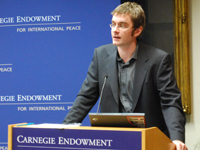Registration
You will receive an email confirming your registration.
IMGXYZ1340IMGZYXCognitive factors may be behind the prevalence of engineers in violent radical Islamist groups, rather than recruitment for technical skills, as conventional wisdom holds. Professor Steffen Hertog, of Sciences Po in Paris, discussed his findings on whether engineers and those with other technical education are overrepresented among radical Islamist groups in the Middle East and South Asia and why this occurs. Marc Sageman, of Sageman Consulting, LLC, provided his perspective on Hertog’s findings, while Christopher Boucek of the Carnegie Endowment moderated.
Higher Education, Conservatism, and Engineering
- Hertog expressed his belief that a person’s choice of type of education reveals as much or more than the level of education about one’s biographical trajectory.
- Hertog points out that while engineers in the Islamic world are members of status elite due to the prestige associated with the field, when they are given a choice between different ideologies, engineers tend to systematically go for the Islamist option. The prestige associated with the field could explain their general political frustration in the face of developmental failure and repression.
- Based on a varied sample of radical Islamic groups from the Muslim world, Hertog found that members of such radical Islamist groups were four times as likely to have upper-level education as the general population. Among those with higher education, engineers are three times as prevalent as other graduates if compared to the general population of the university-educated. Among the members of violent radical Islamist groups whose subject of study was known, about 44 percent had engineering backgrounds.
- In comparing Islamist militant groups to non-Islamist ones, Hertog found violent right-wing conservative groups in the West to have a high representation of engineers in their ranks, though not as strongly as among Islamists. He found practically no engineers in extremist leftist groups, with the exception of some organizations in Turkey and Iran.
Cognitive Factors Rather Than Recruitment Concerns
- There is no supporting evidence for the claim that engineers are recruited for their technical skills. Hertog explained that only a few members would need this skill set, as the technology used by these organizations is quite simple. He also points out that the technical skills needed by terrorist organizations call more for individuals with military experience.
- A bias on cognitive/psychological levels could be behind the correlation Hertog found in his data. This might be explained by several factors, including the fact that a search for unambiguous truths, stereotypical thinking, and a need for cognitive closure are somewhat more frequent traits among engineers.
- Engineering is an applied rather than a foundational science. Applied sciences provide answers rather than attempting to address fundamental questions. It may be, according to Hertog, that these engineers are less adept at dealing with the complexity of the social and political world.
Reservations on Cognitive Theory
Marc Sageman pointed to groups in Algeria and Morocco as examples of why he believes that Hertog’s claim of engineers being dominant among Islamist groups is not universally true.
- Sageman believes that while engineers used to be more dominant, their numbers have decreased within radical Islamist groups, as general levels of education have dropped. He theorizes that this is because any wave of terrorism starts at universities. As organizations mature, the number of highly educated individuals, including engineers, declines.
- Sageman also argued that engineers are more likely to be found in such organizations than lawyers, for example, because engineering is an action-oriented field as opposed to law.
